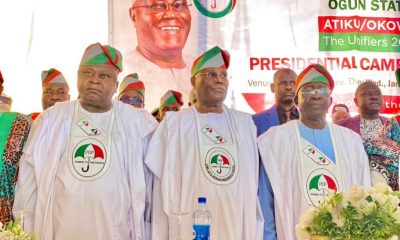Business
Exit of GlaxoSmithKline from Nigeria: What lessons?
Published
12 months agoon
By
Marcel Okeke
By Marcel Okeke
The sudden exit of GlaxoSmithKline (GSK) Consumer Nigeria Plc announced via a letter to the Board of directors of the company (which went viral), really has a lot of symbolism and significance. The letter says: “In our published Q2 results we disclosed that the GSK UK Group has informed GlaxoSmithKline Consumer Nigeria Plc of its strategic intent to cease commercialization of its prescription medicines and vaccines in Nigeria through the GSK local operating companies and transition to a third-party direct distribution model for its pharmaceutical products.
The Haleon Group has also separately informed the Board of its intent to terminate its distribution agreement in the coming months and to appoint a third-party distributor in Nigeria for the supply of its consumer healthcare products.”
GSK Pharmaceutical shuts down operations in Nigeria
The letter dated August 3, 2023 and signed by the company secretary, says “for the above reasons, and having together with GSK UK, evaluated various other options, the Board of GlaxoSmithKline Consumer Nigeria Plc has concluded that there is no alternative but to cease operations.” From here, the letter went on to convey the tone of GSK’s hurried exit from Nigeria ‘with immediate effect.’
It says: “today we are briefing our employees…the Board is conscious that shareholders will have many questions…and we will be shortly submitting to the Securities and Exchange Commission (SEC), a draft Scheme of Arrangement which may, if approved, see shareholders other than GSK UK, receive an accelerated cash distribution and return of capital.”
From available information, GSK has been in Nigeria for upwards of five decades; and parades some of the most popular and successful brands of medicines and pharmaceutical products, including Panadol, Panadol Extra, Andrews Liver Salt, Voltaren, Ampiclox, etc. The company, a multinational blue chip, is quoted on the Nigerian Stock Exchange, and is owned 53.6 per cent by Nigerian shareholders and 46.4 per cent by GSK UK.
By all yardsticks, the company, with a Nigerian as Managing Director and Chief Executive, has been doing well in the Nigerian market over the years. Indeed, its annual report for the year ended December 31, 2022, showed that it recorded a total revenue of over N25 billion, and paid a dividend of 55 kobo per share.
So, what went wrong, to warrant the ‘hurried’ exit from Nigeria? The point must be made that GSK came into the country in the heydays of the Nigerian economy—when the petrodollar came in steady volumes. And the Naira was stronger than the currency of the metropole—the British Pound Sterling.
The purchasing power parity between the Naira and the Pound was no issue. Over time, however, the balance got remarkably tilted against the Naira, so much so that the revenues/earnings of the local GSK in Nigeria could no longer be easily repatriated. Indeed, in the past decade or so, the business climate in Nigeria has deteriorated markedly—to the extent that not a few companies had elected to leave the country for more business-friendly climes around the globe. Some that could not repatriate much of their accumulated revenues and/or earnings were ‘compelled’ to re-invest them (locally) in the Nigerian subsidiaries.
This year, a combination of endogenous and exogenous factors have combined to worsen Nigeria’s business terrain. Policies—ranging from Naira redesign, petrol subsidy removal, multiple exchange rates unification to multiplicity of taxes and levies, etc.—have rather been scorching businesses. The fallout of all these, including their unintended consequences, have been asphyxiating to all economic agents—including businesses—big or small.
To a ‘veteran’ in the Nigerian business terrain, the pace and variety of ‘reforms’ and policy changes (in 2023 alone) can only be described as terrific. Policies, reforms, ‘new agendas’ and programmes since the dawn of 2023 have been coming in ‘torrents’, and have left businesses flustered.
President Muhammadu Buhari in the twilight of his administration kept junketing round the country, commissioning even uncompleted projects—including the much-awaited Dangote Refineries. Today, almost three months after the refinery was ‘commissioned’, it is yet to start spewing products.
In fact, news now has it that the refinery would get operational only by 2025! That is two years after it was ‘commissioned’ by the Buhari administration.
Similarly, on the eve of his exit from office on May 29, 2023, President Buhari hurriedly signed some draconian tax bills among others into law; thus, further choking businesses and hardening their environment. For President Bola Ahmed Tinubu, no sooner was he sworn-in than he made policy pronouncements that today, remain a tremor to the Nigerian economy. He has also gone ahead to reverse, cancel, suspend or postpone the implementation of some of those tax laws and other ill-digested legislation enacted by President Buhari just few days to the end of his tenure. All these truly left the business community dazed and confused!
As the Nigerian economy got badgered and battered by ‘deluge’ of policies and somersaults (in recent times), practically all indicators have gone haywire. Inflation is on a runaway pace—at 18-year high of 22.8 per cent in June 2023. Exchange rate of the Naira against the dollar is fast approaching N900/$1, from around N460/$1 in May 2023. Petrol (Premium Motor Spirit, PMS) now goes for about N700 per litre at the pump as against N185 per litre in May this year.
All these have translated into sharp rise in cost of transportation, high prices of foodstuff, weak consumer demand/disposable income/consumption, etc. These are coupled with deepening and lingering insecurity in the land—with each economic agent facing existential threat ceaselessly.
This awful reality and dreary outlook is no good habitat for businesses, especially the multinationals that have the entire globe to choose best locations. Apparently, therefore, while many blue chips listed on the Nigerian Stock Exchange are counting their losses in billions during the first half-year 2023, the British conglomerate (GSK) opted to pull out of Nigeria.
For a company that has been in the country since 1972, the sudden exit of GSK from Nigeria is a direct ‘vote of no confidence’ on the country. By extension, the exit of GSK is a show of revulsion against policy confusion and foggy economic outlook that faces Nigeria.
It is certainly a clear signal to the entire world that the Nigerian business environment is not only unattractive but also uninhabitable. GSK’s exit at this time shows unequivocally that it can no longer ‘manage’ to simply exist (and not thrive) in the choking and uncertain terrain that Nigeria has become.
At a micro level, the hurried exit of GSK Nigeria will unwittingly unleash many of its employees into the ‘jobless’ market. It is very unlikely that the departure of the company will leave its (ex-) staff in Nigeria better-off. This is despite the promise that “we will treat them fairly, respectfully and with care…” contained in the company secretary’s letter.
In fact, if anything, this promise is essentially to allay the justifiable fears of the employees, whose number is put at about four hundred. On their own part, Nigerian shareholders of the company are already getting apprehensive and restive.
Chairman Emeritus of the Independent Shareholders Association (ISA), Sunny Nwosu, has reportedly criticised the Nigerian government for creating an unfavourable business climate that pushes out businesses. Nwosu however insisted that “whatever is the case, Nigerian investors must be adequately compensated.”
The shareholder-activist also alluded to the fact that the un-repatriated revenues of many big companies in Nigeria like GSK have been a key disincentive and source of frustration. Pointing out that such revenues have been piling up over the years, the ISA chief urged government to begin to budget for such overdue repatriations.
As GSK leaves Nigeria, there is fear that the move will trigger a bandwagon effect, a possibility that could mean the exodus of many more businesses from Nigeria.
The huge “foreign exchange losses” reported by many blue chips in the first half 2023 as a result of recent government policies constitute a serious threat to the economy. It’s a wakeup call on the government to come up with the right initiatives.
- Mr. Okeke, an economist, sustainability expert and consultant on business strategy and is a National Daily Columnist. He can be reached at: [email protected]
You may like
Trending

 Comments and Issues2 days ago
Comments and Issues2 days agoAs Ariwoola takes the judiciary to the top of the grease pole

 Business6 days ago
Business6 days agoNMDPRA Chief faces backlash over comment on Dangote Refinery

 Business1 week ago
Business1 week agoGlobal cyber outage disrupts flights, Banks, telecoms, Media

 Business1 week ago
Business1 week agoKPMG criticizes FG’s 50% windfall tax, foresees legal disputes

 Business5 days ago
Business5 days agoZenith Bank retains position as Nigeria’s Tier-1 capital leader

 Education7 days ago
Education7 days agoJAMB reacts to allege age limit by ministry of education

 Comments and Issues5 days ago
Comments and Issues5 days agoOnanuga and the Surprise from Joe Igbokwe

 News6 days ago
News6 days agoPhilip Shaibu officially joins APC, dumps PDP







